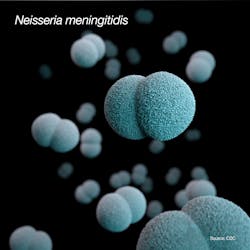An analysis of meningococcus isolates from U.S. health departments has identified a novel strain of ciprofloxacin-resistant and beta-lactamase–producing Neisseria meningitidis, scientists with the Centers for Disease Control and Prevention (CDC) and the Maryland Department of Health reported in Morbidity and Mortality Weekly Report.
The findings prompted the CDC to issue a health advisory with recommendations for healthcare providers and public health officials.
N meningitidis is the bacterium that causes meningococcal disease, a sudden-onset, life-threatening infection of the lining of the brain and spinal cord or the bloodstream. Rates of meningococcal disease have been declining in the United States since the 1990s, according to the CDC, and only 330 total cases were reported in 2018. Rates are highest in children under the age of 1.
Historically, N meningitidis isolates in the United States have been susceptible to penicillin and ciprofloxacin, two of the antibiotics used for treatment in people with confirmed infections and for prophylaxis (prevention) in those with close contact with infected patients. Quick treatment with antibiotics is considered essential, as the disease can cause death within a matter of hours.
But this January, an isolate that produced a beta-lactamase enzyme (which breaks down beta-lactam antibiotics) and was resistant to penicillin and ciprofloxacin was cultured from a meningococcal disease patient in Maryland, followed by a second case reported by the Maryland Department of Health in February. Those findings prompted the CDC to request isolates from meningococcal disease cases from state health departments and conduct a systematic analysis.

